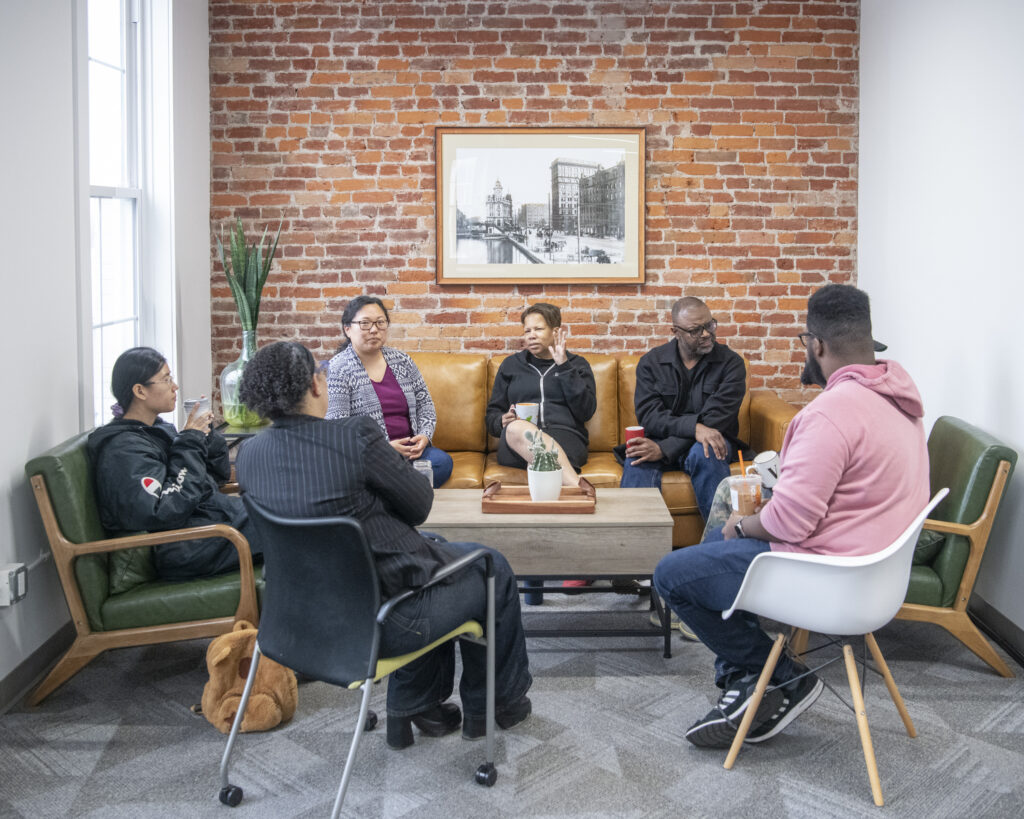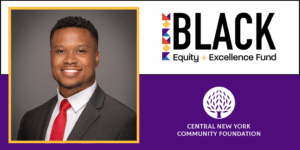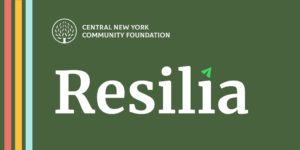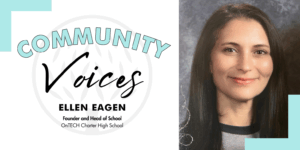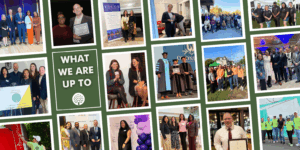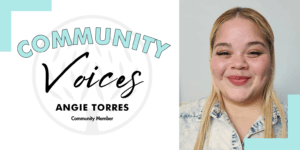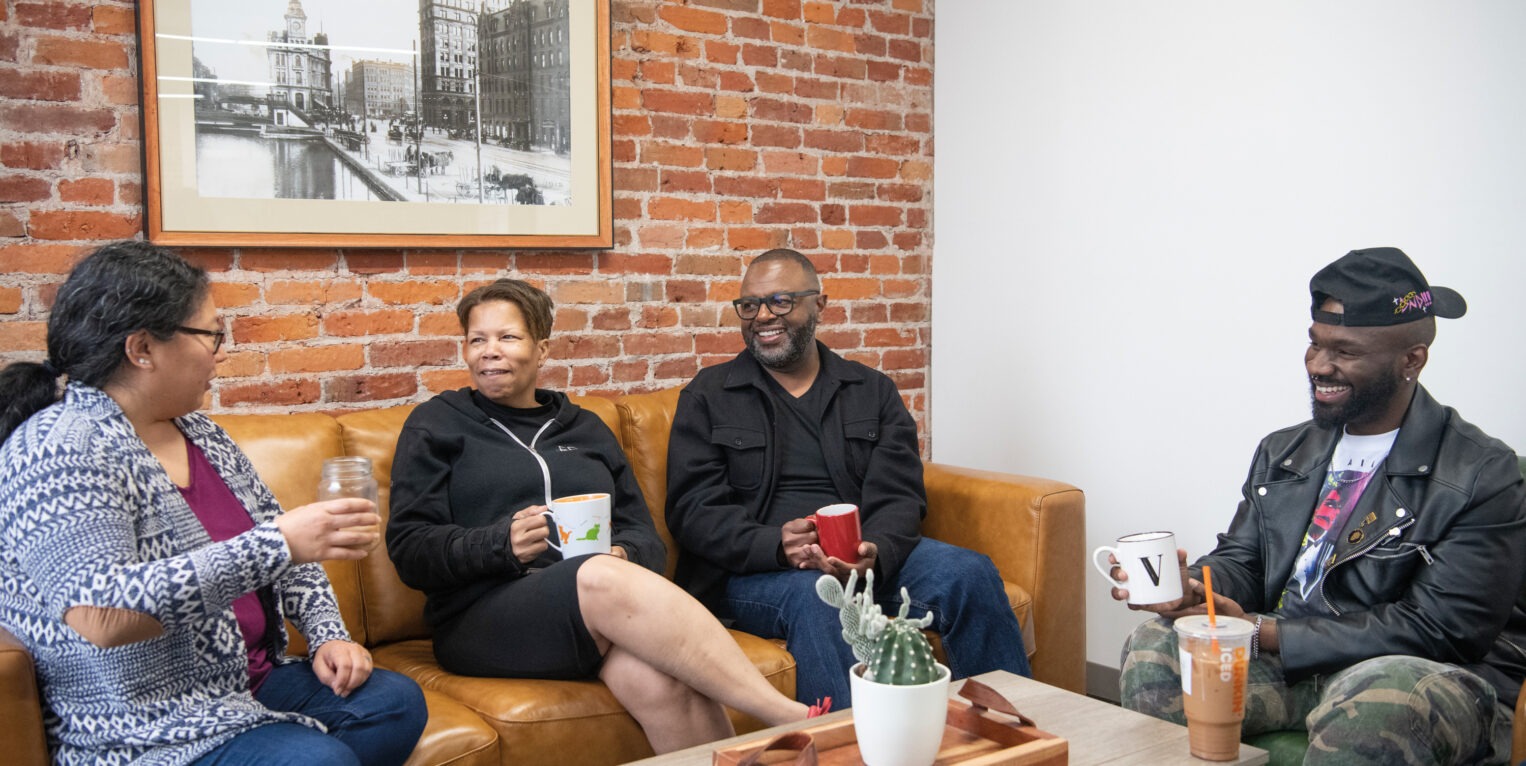
SOFSA Brings People to the Table to Talk about Food Systems
Pictured above: Tim (third from left) sits with community members during a SOFSA coffee hour at GereBlock, a co-working space in downtown Syracuse. | Photo by: Ben Cleeton
Tim Bryant was pursuing a master’s degree focused on food systems and food waste when a traumatic brain injury in 2023 interrupted his studies at Pepperdine University. During his recovery, he began visiting farmers markets and other food venues — linking his rehabilitation with his long-standing interest in food.
“Food has always been important to my life and culture, and as a way to connect folks,” Bryant said.
Today, Bryant is one of four community connectors with the Syracuse-Onondaga Food Systems Alliance (SOFSA). In this role, he helps foster conversations about food systems and builds connections among individuals working in agriculture, food distribution and service throughout Syracuse, Onondaga County and the Onondaga Nation.

Founded in 2019, SOFSA is a network of individuals and organizations working together to strengthen the region’s food system. By fostering community collaboration, SOFSA identifies and addresses the root causes of food inequities, advancing solutions that are responsive, inclusive and community-driven.
Bryant’s role as a community connector includes planning site visits, tours and networking events to help stakeholders better understand the region’s food landscape.
“We’re wasting so much food, yet there are people who are literally starving,” Bryant said. “We can capture this waste. We can save it and keep it out of the landfill. If you understand the effort it takes to produce food and the impact of waste, you’ll be more conscious of not wasting.”
According to the U.S. Department of Agriculture, about a third of U.S. food is wasted — contributing significantly to the climate crisis. Food production, transportation and handling generate carbon dioxide emissions, and when food ends up in landfills, it produces methane, a potent greenhouse gas.
In 2022, we provided SOFSA with the first of three $50,000 grants from our Anti-Poverty Initiative Fund to support its efforts to build local capacity and strengthen collaboration among food system stakeholders. The organization is using the funding to help create a more just and thriving regional food economy — one that reflects the voices and needs of the entire community.
This work includes SOFSA’s Community Listening Series, Community Connectors Program and Food Justice Symposiums, along with other hands-on learning and leadership opportunities to engage young people.
“My role as a community connector is really to bring people together to talk about food,” Bryant said. “We want to give residents as many opportunities as possible to have a seat at the table so they can have a direct impact on shaping local food policy.”
Bryant grew up in an under-resourced New Jersey community, where he experienced discrimination based on his race and family’s income and was the victim of multiple violent crimes. He suffered permanent physical and mental injuries that created significant barriers on his path to achieving his aspirations.

Despite these challenges, Bryant earned a bachelor’s degree in public health from Syracuse University. Along the way, he made the dean’s list every semester, traveled to Europe and Africa, was inducted into Alpha Sigma Lambda, and received one of Syracuse University’s highest student honors — the Chancellor’s Award for Public and Community Service.
Now, Bryant leads community coffee hours and other gatherings focused on food-related topics. Recently, he helped connect Kevin Bailey, founder of Come Out Central New York, an LGBTQIA+ community hub, with SOFSA.
“That connection allowed SOFSA to be present in a space where they might not have been otherwise,” Bryant said. “It just broadens our network.”
He is especially committed to amplifying the voices of the queer community and people with disabilities.
“They are two groups often left on the margins,” he said. “I don’t know how we talk about community if we do not include everyone. It highlights the impact we can have — even beyond food systems.”
SOFSA’s community connectors build relationships and share stories that inform systems change and local policy development.
“They are a way for us to keep our ear to the ground within communities,” said Renee Marcoux, SOFSA’s equity, inclusion and engagement manager. “It helps us uplift community leaders and stay accountable to the people we serve.”
“We get to center marginalized voices — both from our own lived experiences and those we connect with,” Bryant added. “It closes the gap between the people doing the work and the people being served. It creates a two-way conversation.”
“When people start to connect with one another, they begin to realize how much we share and how many ways there are to see our collective humanity,” he said. “Food is the perfect entry point — we all have a relationship to it through family, culture and ritual. Bringing people together around food reminds us that there’s work to be done — and that we don’t have to do it alone.”
